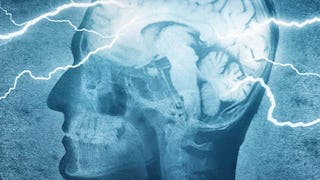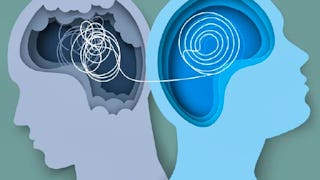Many people around the world struggle with substance use disorders and addictive behaviors. You might know someone, possibly a family member or close friend, who is currently dealing with one of these problems. This course provides a review of common substance use disorders associated with the use of common depressants, opioids, stimulants, hallucinogens, dissociative drugs, and inhalants. Because they share many of the same characteristics, addictive behaviors, such as gambling and gaming disorders, are covered. In addition, the course discusses the diagnostic criteria, demographics, contributing factors, and treatments for each disorder.

Enjoy unlimited growth with a year of Coursera Plus for $199 (regularly $399). Save now.

Disorders Due to Substance Use and Addictive Behaviors
This course is part of multiple programs.

Instructor: Kyle Smith
5,880 already enrolled
Included with
(74 reviews)
Recommended experience
Skills you'll gain
Details to know

Add to your LinkedIn profile
37 assignments
See how employees at top companies are mastering in-demand skills

Build your subject-matter expertise
- Learn new concepts from industry experts
- Gain a foundational understanding of a subject or tool
- Develop job-relevant skills with hands-on projects
- Earn a shareable career certificate

There are 11 modules in this course
This module introduces you to your PsycLearn Essentials course. Find out what’s included in this course and how to navigate the modules and lessons. You’ll also learn valuable study tips for successful learning.
What's included
1 video7 readings
What's included
1 video8 readings3 assignments
This module describes the substance use disorders involving depressants, alcohol, and cannabis. For each disorder, the diagnostic criteria, prevalence, demographic characteristics, and neurochemical effects on the brain are described.
What's included
1 video9 readings3 assignments
This module describes the substance use disorders for stimulants, hallucinogens, dissociative drugs, and inhalants are introduced. For each disorder, the diagnostic criteria, prevalence, demographic characteristics, and neurochemical effects on the brain are described.
What's included
11 readings3 assignments
This module describes the biological, psychological, and sociocultural contributing factors for disorders of substance use.
What's included
1 video9 readings4 assignments
This module describes the biological, psychological, and sociocultural treatments for disorders of substance use.
What's included
6 videos17 readings4 assignments
This module describes the diagnostic criteria, contributing factors, and treatments for disorders of addictive behaviors.
What's included
5 readings3 assignments
This final content module brings all of the previous course material together and gives you material to review and questions for you to use to assess your learning.
What's included
32 readings16 assignments
This module contains a cumulative quiz.
What's included
1 assignment
This module contains a glossary, course references and a list of contributors to the course.
What's included
3 readings
This module provides a variety of information and tools from the American Psychological Association (APA) that will help inspire you as you complete your coursework and plan your career goals. Explore APA resources on various psychological issues and scholarly research and writing; a list of sites providing valuable resources on diversity, equity, and inclusion in psychology education and in the professional community; resources on a career in psychology; and links to career opportunities at the APA.
What's included
8 readings
Earn a career certificate
Add this credential to your LinkedIn profile, resume, or CV. Share it on social media and in your performance review.
Instructor

Offered by
Explore more from Psychology
 Status: Free Trial
Status: Free TrialAmerican Psychological Association
 Status: Free Trial
Status: Free TrialAmerican Psychological Association
 Status: Preview
Status: Preview Status: Preview
Status: PreviewEmory University
Why people choose Coursera for their career




Learner reviews
74 reviews
- 5 stars
87.83%
- 4 stars
12.16%
- 3 stars
0%
- 2 stars
0%
- 1 star
0%
Showing 3 of 74
Reviewed on Oct 12, 2025
Good course! A lot of useful and practical information.
Reviewed on Jun 11, 2025
This was a comprehensive and useful course. The material was presented logically and was effective at explaining substance use disorders and addictive behaviors.
Reviewed on Sep 23, 2025
Relevant information and quick delivery in a comprehensive manner

Open new doors with Coursera Plus
Unlimited access to 10,000+ world-class courses, hands-on projects, and job-ready certificate programs - all included in your subscription
Advance your career with an online degree
Earn a degree from world-class universities - 100% online
Join over 3,400 global companies that choose Coursera for Business
Upskill your employees to excel in the digital economy
Frequently asked questions
To access the course materials, assignments and to earn a Certificate, you will need to purchase the Certificate experience when you enroll in a course. You can try a Free Trial instead, or apply for Financial Aid. The course may offer 'Full Course, No Certificate' instead. This option lets you see all course materials, submit required assessments, and get a final grade. This also means that you will not be able to purchase a Certificate experience.
When you enroll in the course, you get access to all of the courses in the Specialization, and you earn a certificate when you complete the work. Your electronic Certificate will be added to your Accomplishments page - from there, you can print your Certificate or add it to your LinkedIn profile.
Yes. In select learning programs, you can apply for financial aid or a scholarship if you can’t afford the enrollment fee. If fin aid or scholarship is available for your learning program selection, you’ll find a link to apply on the description page.
More questions
Financial aid available,

